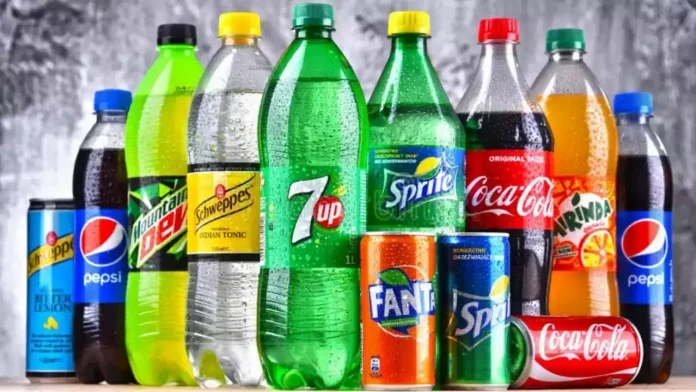India’s carbonated soft drinks segment is falling short of its growth potential due to obstacles like high taxes under the GST regime, despite government initiatives such as ‘Make in India’ and ‘Aatmanirbhar Bharat,’ according to a report from the economic think tank ICRIER. World͏͏ Bank͏͏ data͏͏ reveals͏͏ that͏͏ India͏͏ has͏͏ one͏͏ of͏͏ the͏͏ highest͏͏ total͏͏ tax͏͏ rates͏͏ on͏͏ sugar-sweetened͏͏ beverages͏͏ (SSBs),͏͏ with͏͏ carbonated͏͏ soft͏͏ drinks͏͏ (CSDs)͏͏ facing͏͏ a͏͏ total͏͏ tax͏͏ rate͏͏ of͏͏ 40%͏͏ as͏͏ of͏͏ 2023.
Global͏͏ Comparison͏͏ Highlights͏͏ Tax͏͏ Disparities:
According͏͏ to͏͏ the͏͏ report͏͏ titled͏͏ ‘Carbonated͏͏ Beverages͏͏ Industry͏͏ in͏͏ India:͏͏ Tax͏͏ Policy͏͏ to͏͏ Promote͏͏ Growth,͏͏ Innovation͏͏ and͏͏ Investment’,͏͏ more͏͏ than͏͏ 90%͏͏ of͏͏ countries͏͏ that͏͏ impose͏͏ taxes͏͏ on͏͏ sugar-sweetened͏͏ beverages͏͏ (SSBs)͏͏ have͏͏ a͏͏ lower͏͏ tax͏͏ rate͏͏ than͏͏ India.
Consumers,͏͏ both͏͏ in͏͏ India͏͏ and͏͏ internationally,͏͏ are͏͏ increasingly͏͏ opting͏͏ for͏͏ low-sugar͏͏ and͏͏ no-added-sugar͏͏ beverage͏͏ options͏͏ due͏͏ to͏͏ rising͏͏ health͏͏ awareness.
The͏͏ report͏͏ noted,͏͏ “The͏͏ CSD͏͏ market͏͏ is͏͏ evolving͏͏ from͏͏ traditional͏͏ high-sugar͏͏ carbonated͏͏ beverages͏͏ to͏͏ low-sugar͏͏ and͏͏ fruit-flavoured͏͏ drinks,͏͏ as͏͏ well͏͏ as͏͏ zero-sugar͏͏ aerated͏͏ water,͏͏ reflecting͏͏ consumers’͏͏ shift͏͏ towards͏͏ healthier͏͏ choices͏͏ and͏͏ government͏͏ initiatives͏͏ like͏͏ layered-sugar-based͏͏ taxes.”
Continue͏͏ Exploring:͏͏ Over͏͏ 50%͏͏ of͏͏ Indian͏͏ households͏͏ consuming͏͏ soft drinks;͏͏ demand͏͏ set͏͏ to͏͏ surge͏͏ with͏͏ intensifying͏͏ heat:͏͏ Report
Producers͏͏ globally͏͏ are͏͏ reformulating͏͏ their͏͏ products͏͏ to͏͏ satisfy͏͏ consumer͏͏ demand,͏͏ aided͏͏ by͏͏ government͏͏ policies͏͏ and͏͏ a͏͏ range͏͏ of͏͏ fiscal͏͏ and͏͏ non-fiscal͏͏ incentives.͏͏ In͏͏ India,͏͏ manufacturers͏͏ are͏͏ likewise͏͏ reviewing͏͏ their͏͏ product͏͏ lines͏͏ and͏͏ launching͏͏ offerings͏͏ like͏͏ zero-calorie͏͏ and͏͏ low͏͏ or͏͏ no-sugar͏͏ options.
The͏͏ report͏͏ stated,͏͏ “However,͏͏ despite͏͏ government͏͏ initiatives͏͏ such͏͏ as͏͏ ‘Make͏͏ in͏͏ India‘͏͏ and͏͏ ‘Aatmanirbhar͏͏ Bharat’,͏͏ the͏͏ CSD͏͏ segment͏͏ is͏͏ struggling͏͏ to͏͏ achieve͏͏ its͏͏ growth͏͏ potential͏͏ in͏͏ scale͏͏ expansion͏͏ due͏͏ to͏͏ challenges͏͏ like͏͏ high͏͏ tax͏͏ rates͏͏ and͏͏ compensation͏͏ cess͏͏ under͏͏ the͏͏ GST͏͏ regime,͏͏ which͏͏ has͏͏ been͏͏ in͏͏ place͏͏ since͏͏ 2017.”
At͏͏ present,͏͏ carbonated͏͏ or͏͏ aerated͏͏ beverages͏͏ fall͏͏ under͏͏ the͏͏ highest͏͏ GST͏͏ slab͏͏ of͏͏ 28%,͏͏ along͏͏ with͏͏ a͏͏ compensation͏͏ cess͏͏ of͏͏ 12%,͏͏ regardless͏͏ of͏͏ their͏͏ sugar͏͏ or͏͏ fruit͏͏ content.
The͏͏ ICRIER͏͏ report͏͏ stated,͏͏ “The͏͏ 40%͏͏ tax,͏͏ regardless͏͏ of͏͏ sugar͏͏ content,͏͏ is͏͏ hindering͏͏ innovative͏͏ companies͏͏ from͏͏ developing͏͏ low-sugar͏͏ options͏͏ and͏͏ scaling͏͏ up,͏͏ while͏͏ also͏͏ discouraging͏͏ existing͏͏ firms͏͏ from͏͏ investing͏͏ in͏͏ product͏͏ reformulation.”
The͏͏ report,͏͏ referencing͏͏ cross-country͏͏ comparative͏͏ data͏͏ on͏͏ SSB͏͏ taxes͏͏ compiled͏͏ by͏͏ the͏͏ World͏͏ Bank,͏͏ highlighted͏͏ that͏͏ India͏͏ has͏͏ one͏͏ of͏͏ the͏͏ highest͏͏ total͏͏ tax͏͏ rates͏͏ for͏͏ carbonated͏͏ soft͏͏ drinks͏͏ (CSDs),͏͏ set͏͏ at͏͏ 40%͏͏ as͏͏ of͏͏ 2023.͏͏ Furthermore,͏͏ more͏͏ than͏͏ 90%͏͏ of͏͏ countries͏͏ imposing͏͏ taxes͏͏ on͏͏ SSBs͏͏ have͏͏ lower͏͏ rates͏͏ than͏͏ India.
India’s͏͏ Carbonated͏͏ Soft͏͏ Drinks͏͏͏ Market:͏͏ Room͏͏ for͏͏ Growth
The͏͏ Indian͏͏ carbonated͏͏ soft͏͏ drinks͏͏ (CSDs)͏͏ market͏͏ is͏͏ relatively͏͏ small,͏͏ generating͏͏ revenue͏͏ of͏͏ USD͏͏ 18.25͏͏ billion͏͏ in͏͏ 2022,͏͏ with͏͏ a͏͏ compound͏͏ annual͏͏ growth͏͏ rate͏͏ (CAGR)͏͏ of͏͏ 19.8%͏͏ from͏͏ 2017͏͏ to͏͏ 2022.
The͏͏ report͏͏ highlighted͏͏ that͏͏ India͏͏ is͏͏ one͏͏ of͏͏ the͏͏ largest͏͏ global͏͏ producers͏͏ of͏͏ fruits͏͏ such͏͏ as͏͏ mango,͏͏ banana,͏͏ guava,͏͏ papaya,͏͏ sapota,͏͏ pomegranate,͏͏ and͏͏ lime,͏͏ as͏͏ well͏͏ as͏͏ sugar,͏͏ which͏͏ are͏͏ often͏͏ used͏͏ in͏͏ the͏͏ CSD͏͏ category.͏͏ It͏͏ stated,͏͏ “There͏͏ is͏͏ potential͏͏ for͏͏ greater͏͏ utilisation͏͏ of͏͏ these͏͏ resources͏͏ if͏͏ appropriate͏͏ policies͏͏ are͏͏ implemented͏͏ to͏͏ promote͏͏ their͏͏ use͏͏ in͏͏ CSDs.”
However,͏͏ India͏͏ does͏͏ not͏͏ rank͏͏ among͏͏ the͏͏ leading͏͏ global͏͏ manufacturers͏͏ of͏͏ carbonated͏͏ soft͏͏ drinks͏͏ (CSDs),͏͏ and͏͏ the͏͏ country’s͏͏ CSD͏͏ product͏͏ processing͏͏ capacity͏͏ is͏͏ far͏͏ from͏͏ reaching͏͏ its͏͏ potential.͏͏ Furthermore,͏͏ the͏͏ variety͏͏ of͏͏ offerings͏͏ is͏͏ limited͏͏ compared͏͏ to͏͏ other͏͏ developing͏͏ nations͏͏ such͏͏ as͏͏ Thailand͏͏ and͏͏ the͏͏ Philippines.
As͏͏ a͏͏ result,͏͏ India͏͏ lags͏͏ behind͏͏ several͏͏ developing͏͏ nations͏͏ in͏͏ revenue͏͏ from͏͏ the͏͏ CSD͏͏ market.͏͏ This͏͏ shortfall͏͏ has͏͏ left͏͏ the͏͏ sector’s͏͏ potential͏͏ to͏͏ attract͏͏ investment͏͏ and͏͏ create͏͏ jobs—particularly͏͏ in͏͏ Tier͏͏ 2͏͏ and͏͏ Tier͏͏ 3͏͏ cities—largely͏͏ untapped.
“This͏͏ is͏͏ primarily͏͏ due͏͏ to͏͏ the͏͏ classification͏͏ of͏͏ this͏͏ sector͏͏ as͏͏ a͏͏ major͏͏ source͏͏ of͏͏ tax͏͏ revenue͏͏ by͏͏ states͏͏ through͏͏ state͏͏ excise,͏͏ and͏͏ now͏͏ by͏͏ the͏͏ Goods͏͏ and͏͏ Services͏͏ Tax͏͏ (GST)͏͏ Council,͏͏ which͏͏ has͏͏ imposed͏͏ high͏͏ taxes͏͏ and͏͏ cess͏͏ on͏͏ CSDs,”͏͏ the͏͏ report͏͏ stated.





